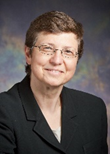Keynote Speakers at ICCCN 2020
Aug. 3, 2020:Professor Klara Nahrstedt
University of Illinois at Urbana-Champaign
USA
Abstract: With the emergence of new 360-degree cameras and VR/AR display devices, more diverse multimedia content has become available and with it the demand for the capability of streaming 360-degree videos to enhance users’ multimedia experience. In this talk, we will discuss the challenges of 360-degree video delivery systems, such as their large bandwidth, low latency demands, users' disorientation and cyber-sickness, and solutions to satisfy the demands, such as rate adaptation of tiled videos, view prediction techniques, content navigation, and control of Quality of Experience. We will also briefly dive into more details of the concept of navigation graphs for 360-degree videos to represent viewing navigation of 360 video content. We will show how navigation graphs are serving as models for viewing behaviors in the temporal and spatial domains to perform the rate adaptation of tiled media associated with view prediction. The experimental results are encouraging and support the claim that the navigation graph modeling provides a strong representation of navigation patterns of users, and its usage enhances the viewing quality experience of 360-degree videos in augmented reality applications.
Joint work with Dr. Jounsup Park, Dr. Michael Zink, Dr. Ramesh Sitaraman.

Klara Nahrstedt is the Ralph and Catherine Fisher Professor in the Computer Science Department, and Director of Coordinated Science Laboratory in the College of Engineering at the University of Illinois at Urbana-Champaign. Her research interests are directed toward tele-immersive systems, end-to-end Quality of Service (QoS) and resource management in large scale distributed systems and networks, and real-time security and privacy in cyber-physical systems such as power grid. She is the co-author of multimedia books 'Multimedia: Computing, Communications and Applications' published by Prentice Hall, and 'Multimedia Systems' published by Springer Verlag. She is the recipient of the IEEE Communication Society Leonard Abraham Award for Research Achievements, University Scholar, Humboldt Research Award, IEEE Computer Society Technical Achievement Award, ACM SIGMM Technical Achievement Award, TU Darmstadt Piloty Prize, the Grainger College of Engineering Drucker Award, and the former chair of the ACM Special Interest Group in Multimedia. She was the general co-chair and TPC co-chair of many international conferences including ACM Multimedia, IEEE Percom, IEEE IOTDI and others. Klara Nahrstedt received her Diploma in Mathematics from Humboldt University, Berlin, Germany in 1985. In 1995 she received her PhD from the University of Pennsylvania in the Department of Computer and Information Science. She is ACM Fellow, IEEE Fellow, and Member of the German National Academy of Sciences (Leopoldina Society).
Aug. 4, 2020:
Professor Roger Wattenhofer
Eidgenössische Technische Hochschule (ETH) Zürich
Switzerland
Abstract: The world's financial system is a complex network where financial institutions such as banks are connected via various kinds of financial contracts. If some financial institutions go bankrupt, then others might suffer as well; the financial network might experience a ripple effect. As such, it should come as no surprise that the next financial crisis will have a strong networking aspect.
In the talk, we will discuss the economy from a networking perspective. Financial networks and computer networks share a number of common topics: For instance, can we build a (financial) network that is robust to failures? How can we incorporate privacy? Or incentives? How do we deal with asynchrony? How can we clean up after a crisis? In general, what could the financial industry learn from the networking community?

Roger Wattenhofer is a professor at ETH Zurich, Switzerland. He received his doctorate from ETH Zurich, then worked some years at Microsoft Research in Redmond, Washington, at Brown University in Providence, Rhode Island, and at Macquarie University in Sydney, Australia.
Roger Wattenhofer's research interests are a variety of algorithmic and systems aspects in computer science and information technology, e.g., distributed systems, positioning systems, wireless networks, mobile systems, software defined networks, social networks, financial networks, deep neural networks. He publishes in different communities: distributed computing, algorithmic theory, networking and systems. His work received multiple awards, e.g. the Prize for Innovation in Distributed Computing for his work in Distributed Approximation. He published the book "Blockchain Science: Distributed Ledger Technology," which has been translated to Chinese, Korean and Vietnamese.
Aug. 5, 2020:
Raghu Ganti, Principal Research Staff Member
IBM T. J. Watson Research Center
USA
Abstract: The last decade has seen an explosion in the volume and availability of space-time tagged data from various moving objects. In this talk, I will cover various AI/ML algorithms developed by IBM in the last decade, examples of which include learning animal movement patterns representing poacher attacks, predicting asteroid-asteroid encounters, and detecting human/drug trafficking activities.
Biography:
Raghu Ganti is a Principal Research Staff Member at IBM's T J Watson Research Center. His primary research interests are in the area of spatiotemporal analytics, from basic algorithms to store and retrieve data to AI/ML techniques on such data. He has also received numerous outstanding technical awards from IBM for his contributions both to research advancements as well as business impact.



